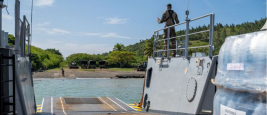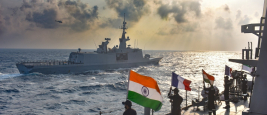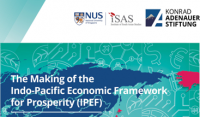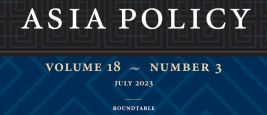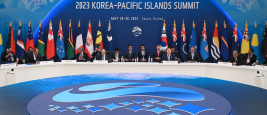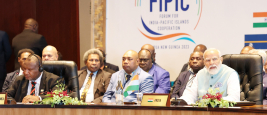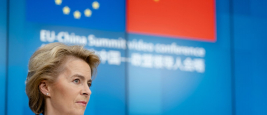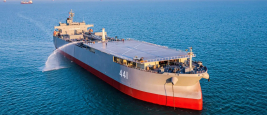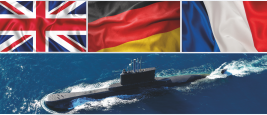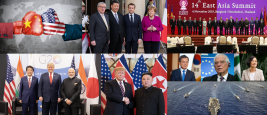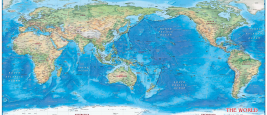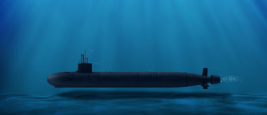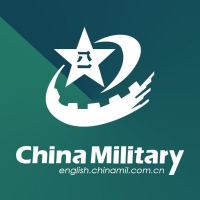The South Pacific Defence Ministers Meeting (SPDMM) is taking place in Nouméa (New Caledonia) from December 4th to 6th of this year.

Indo-Pacific Strategies
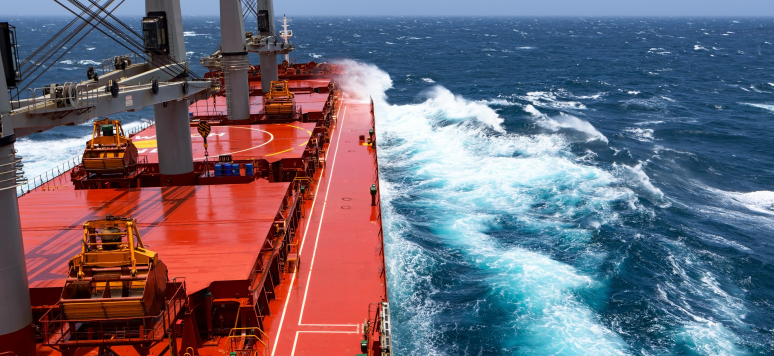
The Indo-Pacific is today a key geopolitical concept that informs the strategies of major international players. A maritime space encompassing the Indian and Pacific Oceans, the Indo-Pacific is above all a political construct that reflects the competition for influence revolving around the Sino-American rivalry. Both an economic and a political center of gravity, this mega-region is also at the heart of essential governance issues for the future (climate change, proliferation, governance of the commons — ocean, cyber, space). Its stability is threatened by transnational risks and inter-state tensions exacerbated by nationalism and the militarization of actors in the area. At the same time, the regional security architecture is now more fragmented with the emergence of new kinds of cooperation frameworks.
Through its research activities, and in conjunction with other relevant centers and programs at Ifri, the Center for Asian Studies seeks to offer a better understanding of strategic issues in the Indo-Pacific, looking in particular at the approaches of the major players in the region, including France and the European Union.
Research Fellow, Head of Japan Research, Coordinator of the Program on Pacific Islands,
...
Research Fellow, Center for Asian Studies
...Senior Advisor, Center for Asian Studies
...Associate Research Fellow, Center for Asian Studies
...As US-China rivalry reaches its peak and the likelihood of a high-intensity conflict in the region seems greater than ever, this report advocates for a pragmatic recalibration of France’s strategic posture in the Indo-Pacific. This adjustment should be grounded in a realistic reframing of...
The paper provides a European Union (EU) perspective on the Indo-Pacific Economic Framework (IPEF).
France was the first European country to announce an Indo-Pacific strategy, launching it in 2018.
Korea (ROK) held the first Korea–Pacific Islands Summit at head-of-state level on May 29/30 and entered an already crowded Pacific region.
Japan and the European Union are increasingly aligned on international economic policies, the product of a similar outlook toward China – concerned without being overtly hostile – and worried about over-reach by the United States.
Prime Minister Narendra Modi’s maiden visit to Papua New Guinea (PNG) on May 20-21, 2023, is a testament to India’s international positioning and search for a global role. In Port Moresby, Modi co-chaired the third Forum for India-Pacific Islands Cooperation (FIPIC) and announced a series of...
The G7 summit in Hiroshima showcased a new international order in the making: in a world where security is indivisible, the priority should be to uphold a collectively shaped rules-based order and find a modus vivendi with China. The G7 can work toward this by taking into account the...
While French President Emmanuel Macron’s state visit to China is viewed by some to be an exercise in stirring the pot, this does not mean that the European boat has veered off course. The EU is used to robust debate among and within member states, and can take this as another opportunity to...
In January 2023, the Iranian Navy staged a show of force near the Australian Exclusive Economic Zone (EEZ) amid growing tensions between Tehran and Canberra.
Economic Security and East Asia: De-risking in an Era of Strategic Competition Conference
Annual Conference of Ifri's Center for Asian and Indo-Pacific Studies. As strategic competition becomes an increasingly dominant feature of the international system today, the “de-risking” of interdependent economic ties has emerged as a new mantra for managing geopolitical uncertainty.
Asia after the War in Ukraine: Re-imagining multilateralism and the risk of high-intensity conflict Hybrid Conference
Annual conference of Ifri's Center for Asian Studies. The war in Ukraine has marked the return of high-intensity conflict in Europe and represents a profound, structural shift in the region’s strategic environment. It also takes place against a backdrop of a decades-long...
Conference with Subrahmanyam Jaishankar, External Affairs Minister of India Ifri Conferences
How India sees France. A conference with Subrahmanyam Jaishankar, External Affairs Minister of India.
Europe in the Indopacific – Key challenges for a mutually beneficial partnership in the region Webinar
This conference is intended to discuss the paper “The Dilemma of Middle Powers – How AUKUS Has Reshaped the Potential for E3 Cooperation in the Indo-Pacific“ and to...
East Asia’s Evolving Economic Order: Toward Cohesion or Fragmentation? Videoconference
The era of hyper globalization is now transforming into an age of geoeconomics, where trade and economic relations are increasingly conditioned by national security concerns. What impact will this shift have on the regional trade architecture and economic strategies in East Asia? <...>
From East Asia to Indo-Pacific: Strategic Risks, Power Shift and New Order in the Making
Regional stability in East Asia is under increasingly heavy strain. As tensions rise between the United States and China, veering towards a fiercer strategic competition that extends well beyond the current trade war, the potential for US-China confrontation looms large.
Approaching the Indo-Pacific: American, French, Indian and Japanese Visions
The Indo-Pacific has become a buzzword since 2017, as it came to be used by all major players in the region stretching from East Africa to the Pacific.
French President Emmanuel Macron's call for Europe to steer clear of a Taiwan conflict -- rooted in France's pride and deep-seated resistance to following America's lead -- has raised questions about where he and Paris really stand on China.
More realistic posture would strengthen Paris' role in Indo-Pacific region
One of Prime Minister Fumio Kishida’s top goals for next month’s Group of Seven summit in Hiroshima is to create a united front on issues like China and Ukraine. But finding a unified approach to dealing with Beijing’s assertiveness might have just become harder.<...>
One year on, the announcement of the Australia-U.K.-U.S alliance has not been accompanied by any major changes to France’s Indo-Pacific defense strategy.
Partners in the Blue Pacific (PBP) is made up of US, UK, Japan, Australia, New Zealand, with the latter two expected to spearhead cooperation efforts. Some experts say France is already interested despite anger over Aukus security pact; the new PBP will become ‘multilateral rather than...
Marine protected areas (MPAs) offer a solution for countries in the region to manage their maritime space. Access to scientific data is required to set MDA.
BEIJING, Oct. 28 -- The 5th session of Beijing Xiangshan Forum Webinar 2021 was held on the evening of October 26 around the topic of “Strategic Stability: Impasse and Way Out”, in which the establishment of the so-called trilateral security partnership, AUKUS, by the US, Britain and Australia...
France is eager to prevent the crisis from spiralling further as it recognises it is in its national interest, and President Macron’s favour, to end it. But damage has been done, writes Ahmed Aboudouh.
Born of a revolution fought for liberty, ties between the United States and its oldest ally, France, have long been fraternal, but they've also been marked by deep French unease over their equality.








